Searching for the best supplement for brain health? This article delves into top contenders like Omega-3 fatty acids, B vitamins, and Lion’s Mane Mushroom, each renowned for their potential to enhance mental function. But how effective are these supplements? We’ll examine the scientific evidence that supports their use and discuss the need for careful consideration due to potential side effects. By understanding the interaction of these supplements with the blood-brain barrier and their influence on the central nervous system, you can make informed decisions about what might work best for you.
Moreover, the quest for improved brain health doesn't stop at supplements. It encompasses a holistic approach that includes maintaining a balanced diet rich in nutrients like healthy fats and leafy green vegetables, regular exercise, and ensuring enough sleep to support psychological well-being. Such lifestyle choices can significantly bolster the benefits of any dietary supplements you take, helping you achieve better cognitive performance and a lower risk of cognitive decline. This guide will provide a comprehensive overview of the best brain supplements and practices that complement their effectiveness, equipping you with the knowledge to enhance your brain health comprehensively.
Key Takeaways
- Key supplements for brain health include Omega-3 fatty acids, B vitamins, and Lion’s Mane Mushroom, each offering unique cognitive benefits but requiring careful consideration regarding their efficacy and potential side effects.
- Nootropic supplements like Ashwagandha, Ginkgo Biloba, and L-theanine show promise in enhancing mental performance, although scientific evidence varies, and a balanced approach is recommended.
- Lifestyle choices such as maintaining a balanced diet, regular exercise, and adequate sleep are crucial for optimal brain health, complementing the effects of dietary supplements and reducing the risk of cognitive decline.
1 Top Brain Health Supplements
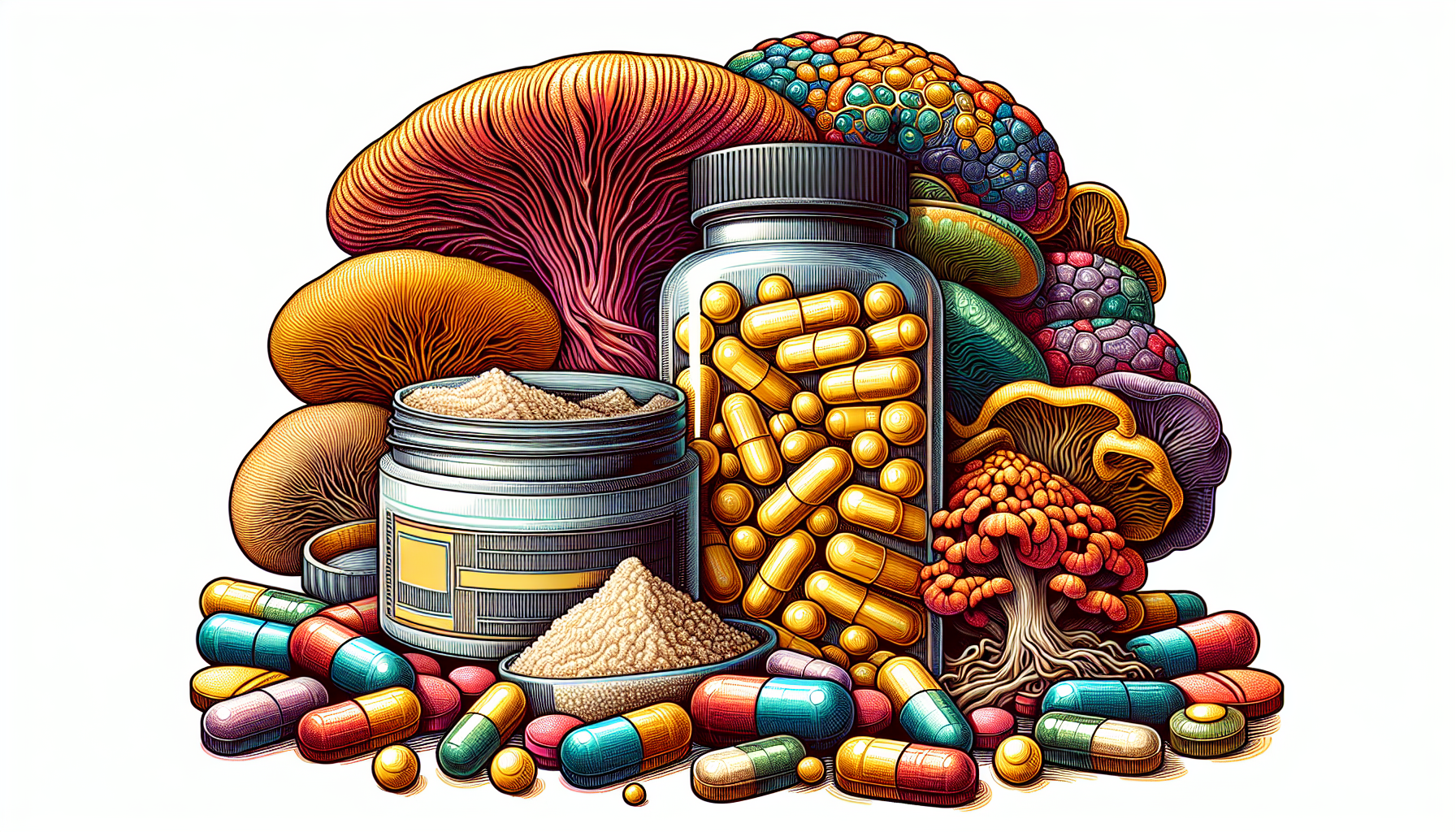
We start our journey to mental clarity by looking at top brain health supplements. These supplements are our allies in achieving cognitive longevity, each with unique properties that bolster brain health and the brain’s capacity to maintain healthy cognitive function.
Among these key supplements are Omega-3 fatty acids, B vitamins, and Lion’s Mane Mushroom, each vying for a spot in our dietary supplement regiment. But do they live up to their reputation? We’ll examine the evidence and compare their functions supporting a healthy brain.
Omega-3 Fatty Acids
Omega-3 fatty acids, the brain supplements’ MVPs, reduce inflammation, and protect our neural networks from the wear and tear of time and disease. Think of these healthy fats as the sentinels of your neuronal membranes, ensuring each cell can function smoothly and efficiently. DHA, a specific type of omega-3, is found in fatty fish and is key to neuronal membrane plasticity, which is essential for learning and memory.
But not all brains get enough of these fatty acids. People with neurodegenerative disorders often have a deficit in EPA and DHA, so there’s a connection between omega-3 and brain health. While the omega-3 magic bullet for dementia remains to be proven, some studies show that omega-3 supplements can improve cognition, especially in older adults or those with a little forgetfulness.
For anyone committed to a plant-based diet, it's crucial to know the outstanding plant-based Omega-3 supplements available. Our article, "From Algae to Awesomeness: Five of The Best Vegan Omega-3 Supplements You Need to Know," is an invaluable guide that will support you on your journey.
B Vitamins
Think of B vitamins as the spark plugs of our brain, firing up our nerve health and cognitive functions. These vitamins form a complex that supports the brain’s intricate electrical networks and helps synthesize neurotransmitters and energy production. Certain members of this family, like B6, B9 (folic acid), and B12, are known for their brain and nerve function support, mood, cognition, and our body’s stress response.
Despite their importance, the story of B vitamins isn’t without its complexities. While they are good for brain health, their effectiveness as memory supplements in pill form is debated, with no clear evidence to support cognition improvement.
For some people, especially those with dietary restrictions or specific health conditions, supplementing with B vitamins may be necessary to avoid deficiencies that can lead to cognitive decline.
Lion’s Mane Mushroom
Lion’s Mane Mushroom pops out of the brain supplements forest as a curiosity, with studies showing it can improve memory, focus, and overall brain function. This natural wonder is supposed to sharpen the mind and support oxygen flow to the brain, a breath of fresh air for our cognitive abilities. Plus, it might help calm the fires of inflammation, so those with anxiety or depression might find some relief.
While it's easy to get excited about the potential of Lion’s Mane Mushroom, it's crucial to approach it with the same caution as any other supplement. Begin with a low dose, gradually increasing it while watching for any side effects, such as rash or blood clotting issues, which some individuals may experience.
For a deeper understanding and to make an informed decision, we highly recommend reviewing our article, "The Many Health Benefits Of Taking A Lion's Mane Supplement." This comprehensive guide provides detailed information on five of the top-selling Lion's Mane products from some of the most reputable companies in the industry. Equip yourself with the knowledge to choose the best supplement for your needs.
Nootropic Supplements for Enhanced Mental Performance

Transitioning from foundational brain health supplements, we now venture into nootropics, the cognitive enhancers that promise to boost brain health and elevate mental performance. These supplements, ranging from plant extracts to synthetic compounds, are tantalizing with their potential to sharpen the mind and enhance cognitive functions. Among the most notable are Ashwagandha, Ginkgo Biloba, and L-Theanine, each with claims and research findings.
We’ll examine the scientific evidence to determine their effect on our brainpower.
Ashwagandha
Ashwagandha, an herb used in Ayurveda, comes to the cognitive stage with:
- Improved cognition
- Calmed psyche
- Memory improvement
- Executive function boost
- Psychological well being
Regular use of this root extract is associated with these benefits, so it could be a good sidekick for those who want to stay sharp and resilient.
The benefits of Ashwagandha go beyond the brain; it’s a holistic approach to wellness. By reducing stress and improving sleep, it not only nourishes the mind but also the body’s overall energy, showing us how our mental and physical health are connected.
If you're eager to delve deeper into the benefits of Ashwagandha, our article, "Five Of The Best Ashwagandha Supplements – Which One Is Right for You?" is the perfect guide to help you make an informed choice.
Ginkgo Biloba
Ginkgo Biloba has been touted as a botanical brain booster with its roots in traditional Chinese medicine. Some studies suggest it may help those with mild cognitive impairment, especially at higher doses for longer periods. But the overall science is a mixed bag.
This ancient tree extract’s journey through clinical trials has been bumpy, with research offering varying degrees of support for its cognitive claims. Still, it’s a popular ingredient in many brain health supplements, often combined with other nutrients like vitamin E and folic acid to support brain health.
L-Theanine
L-Theanine, an amino acid found in green tea leaves, comes to the cognitive stage with a gentle yet powerful effect on mental performance. Research shows it can improve focus and mental speed when combined with caffeine.
L-Theanine with caffeine is a beautiful balance of energy and calm, allowing for alert relaxation for multitasking and sustained concentration. It’s an example of how some supplements can work together to improve cognition, balancing the jitters with mental clarity.
Essential Nutrients for a Healthy Brain
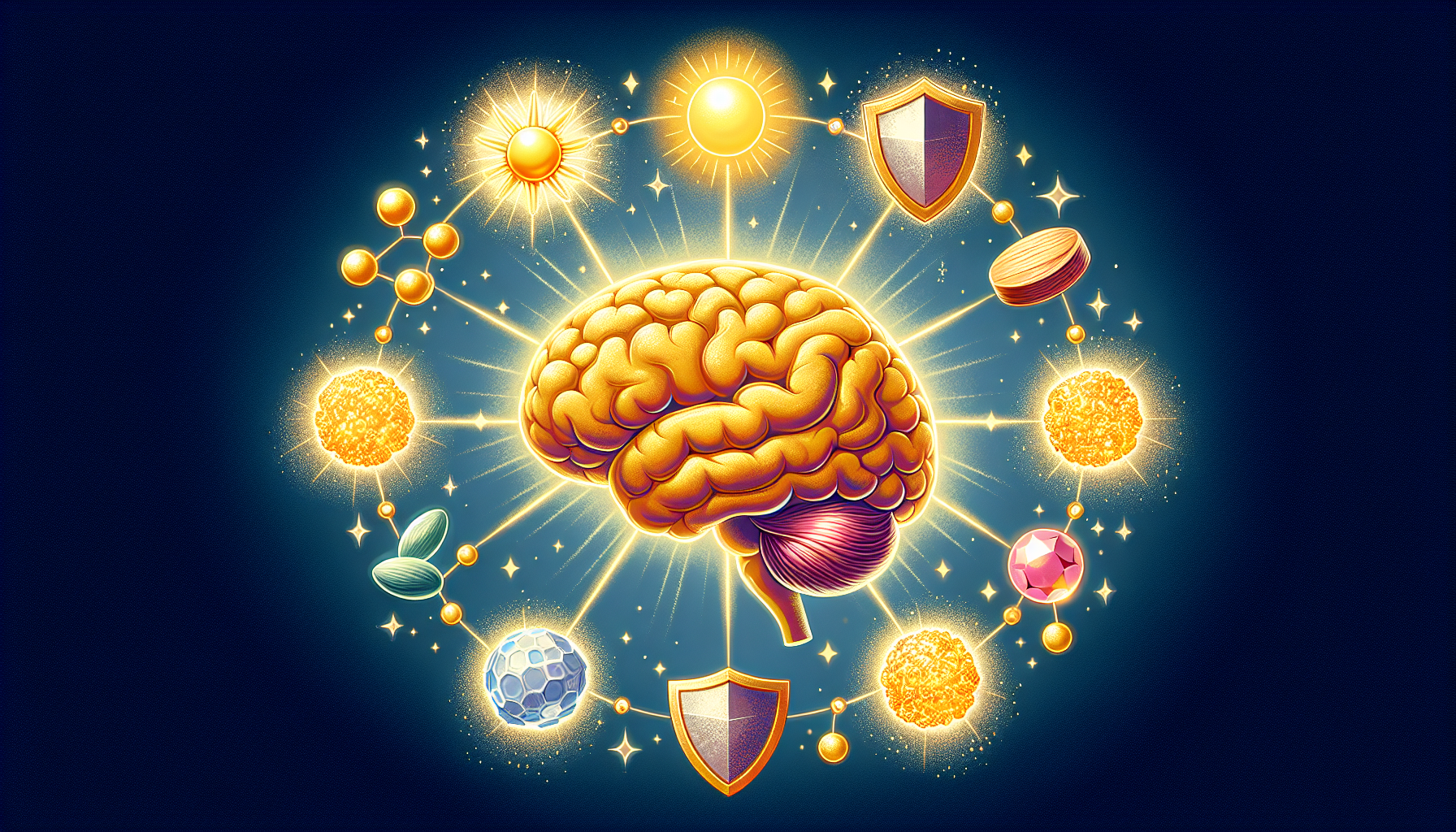
Now, let’s look at the nutrients that are the foundation of a healthy brain. These are the bricks that are involved in brain function and brain health.
Vitamin D, Magnesium, and Choline are the big three in this category, and we’ll look at how they contribute to a nourished and working brain.
Vitamin D
Vitamin D is often called the “sunshine vitamin,” and it’s shining brightly regarding brain health. Its receptors are scattered throughout the brain tissue, so it’s clear they play a big role in cognitive function. Deficiencies in Vitamin D are like clouds blocking the sun and are linked to mood disorders, depression, and, more ominously, cognitive decline, dementia, and even schizophrenia.
The quest for enough Vitamin D can be blocked by modern life as indoor work and sunscreen use cast a shadow over our natural production of this important nutrient. So, supplementation is a lifeline for many wanting to maintain healthy levels and protect their cognitive future.
Magnesium
Magnesium, the calming mineral, is key to the cognitive symphony by supporting neural function and protecting against the wear and tear of aging and disease. It’s like the conductor that ensures the synaptic plasticity of the brain’s orchestra so learning and memory can harmoniously play.
But in the chaos of modern diets, magnesium is often in short supply, and that can cause cognitive dissonance and increase the risk of neurological disorders. Eating magnesium-rich foods like leafy greens and whole grains can help keep the balance in check for optimal brain function.
Choline
Choline is often in the shadow of its more famous nutritional cousins but is an unsung brain health hero. This essential nutrient is the backbone of acetylcholine, a neurotransmitter that acts as a messenger and relays signals for memory and cognition.
Ensuring adequate choline intake is crucial for maintaining open lines of communication within the central nervous system, potentially reducing the risk of neurodegenerative diseases such as Alzheimer’s. This often-overlooked nutrient plays a starring role in cognitive health. Given its lesser-known status compared to more common nutrients, we encourage you to explore our comprehensive article, "Choline - What You Need To Know About This Little-Known Supplement". This resource will address all your questions and provide five excellent selection options.
Additional Supplements to Consider
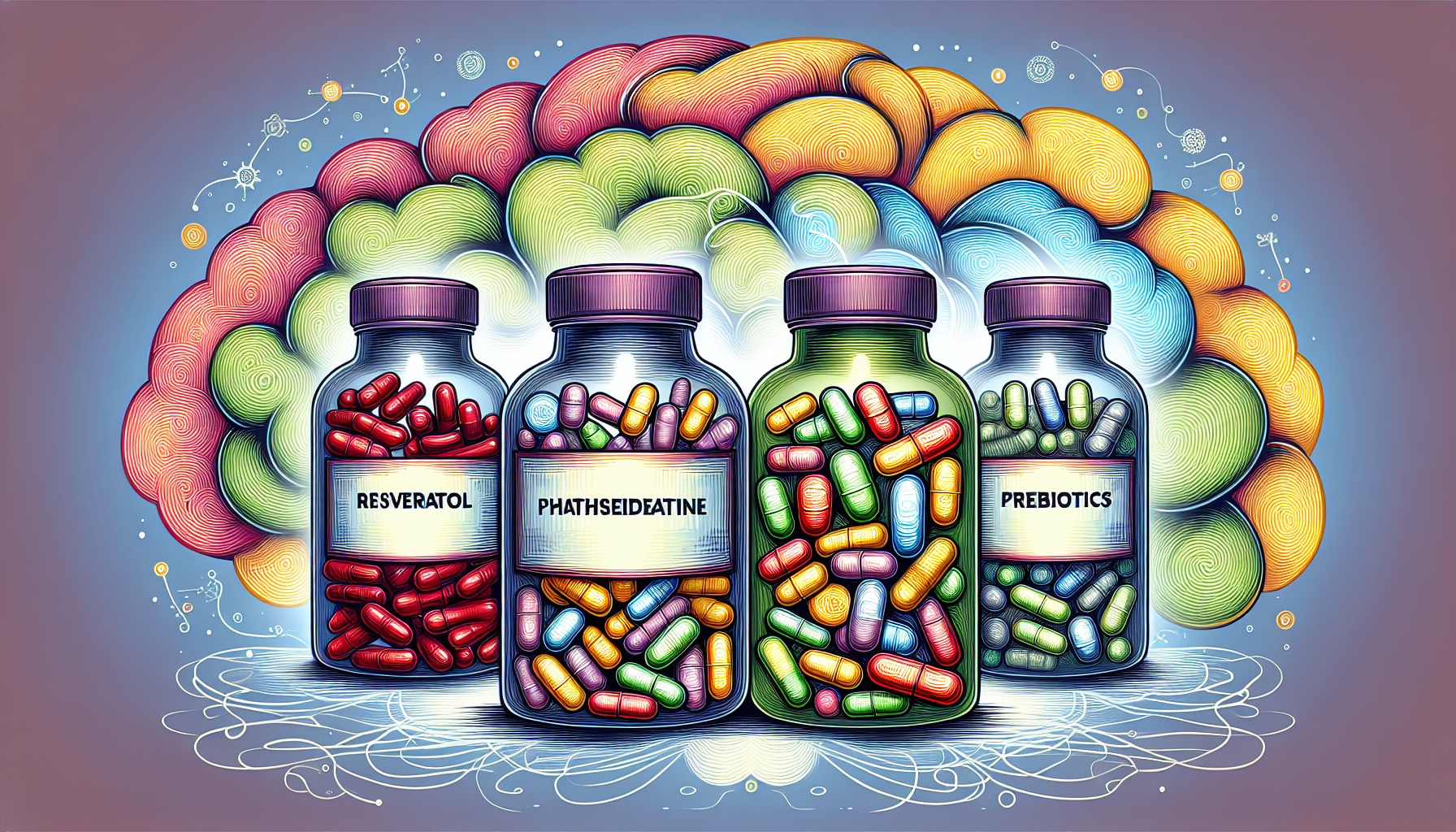
In addition to the well-known supplements for brain health, many more may help with cognition. Resveratrol, Phosphatidylserine (PS), Probiotics, and Prebiotics each have their own story and mechanism of action. Although they may not be the stars, their supporting roles in the cognitive enhancement story are worth looking into.
Resveratrol
Resveratrol, the polyphenol in red wine, has antioxidant properties to protect neurons. That’s got to slow down cognitive decline, but more research is needed.
In addition to its antioxidant activity, resveratrol also increases cerebral blood flow, so a toast to brain health with resveratrol may be tempting. Still, more research is needed to know for sure.
Phosphatidylserine (PS)
Phosphatidylserine (PS) is a phospholipid that wraps around and protects brain cells. PS is the brain’s insulation to keep cognitive processes warm and running. It activates signaling pathways and releases neurotransmitters essential for cognitive maintenance.
Our natural PS production decreases as we age, and cognitive function fades. Supplementing with PS has been shown to help memory, mood, and focus and is hopeful for cognitive aging and inflammation in the brain.
Probiotics and Prebiotics
Probiotics and Prebiotics, the gut health duo, don’t stop at the digestive tract. A healthy gut microbiome is a soil for brain function, mental well-being, and mood. Studies, including one in 2021, show that probiotics can help brain function, relieve stress, and show how our gut and gray matter are connected.
Prebiotics like galacto-oligosaccharides (GOS) feed our gut flora and mood and mental performance. That’s why a fiber-rich and complex carb diet is key to the gut and the brain.
Lifestyle Tips for Optimal Brain Health
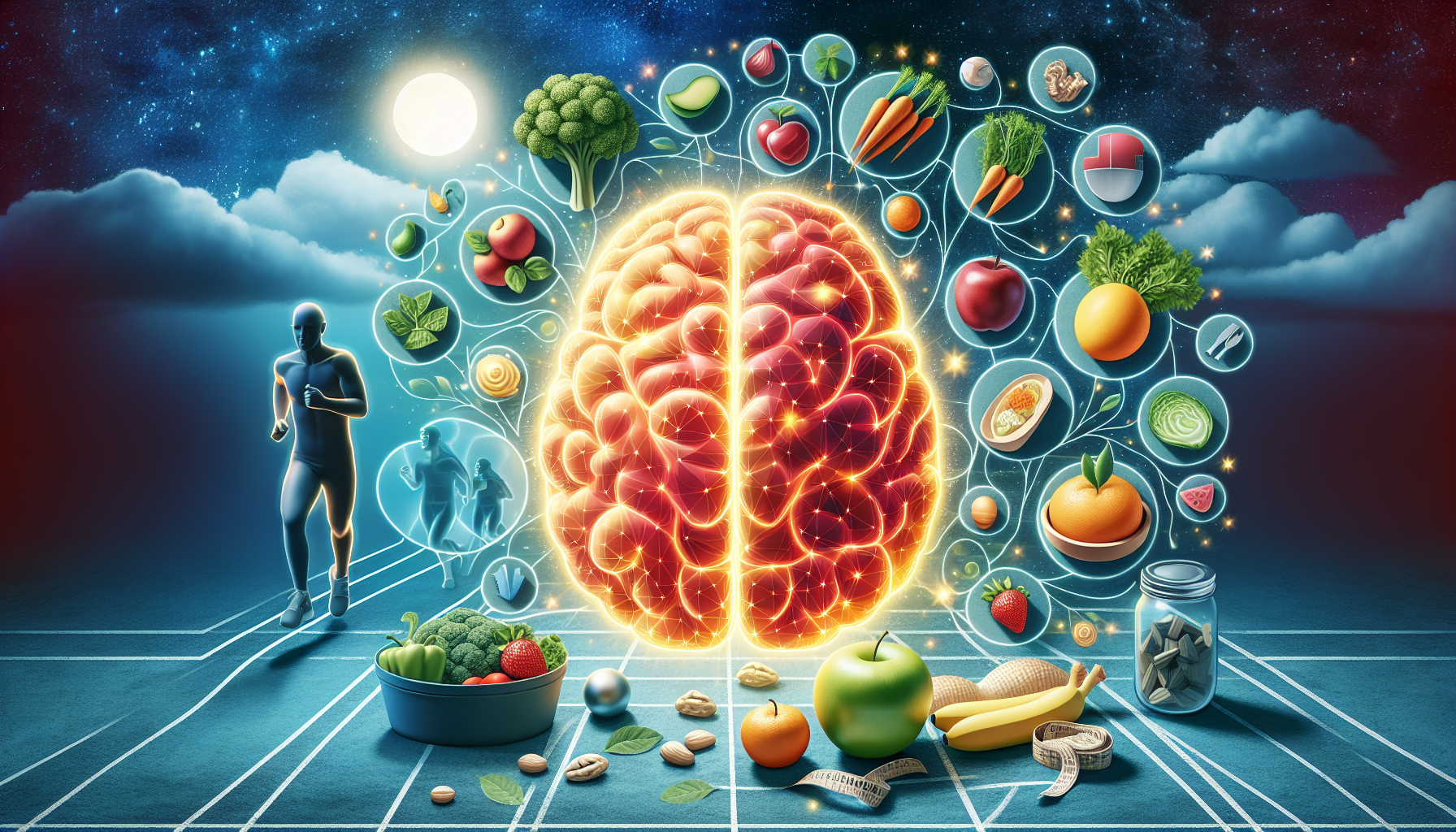
While supplements are powerful, they work best with a lifestyle that supports cognitive health. A balanced diet, exercise, and sleep are the trilogy of a brain-healthy life. These habits make brain health supplements more effective and are primary interventions for cognitive function and mental health.
We’ll see how these lifestyle habits can be as powerful as any supplement for a healthy brain.
Balanced Diet
A balanced diet is like a symphony of nutrients that helps keep our brains in shape. Take the Mediterranean diet, for example. It focuses on good fats, fresh fruits and veggies, and fish packed with omega-3s. This diet has been shown to lower the risk of Alzheimer’s Disease, making it a great choice for brain health. Then there's the MIND diet, which combines the best parts of the Mediterranean and DASH diets. It highlights foods like berries and leafy greens that boost brain power.
The adage “you are what you eat” rings particularly true regarding brain health. A healthy diet not only acts as the foundation for good health but also serves as a preventive measure against cognitive decline.
It’s a reminder that before reaching for a bottle of supplements, one should consider the plate, ensuring it’s rich with the nutrients the brain craves for optimal performance.
Regular Exercise
Regular exercise is the drumbeat to which our brain cells march, enhancing healthy blood flow and encouraging the growth of new neurons. Engaging in physical activities, particularly those that raise the heart rate, has significantly increased brain volume in regions linked to memory and healthy brain function. Aerobic exercises, for instance, are like a breath of fresh air for the brain, improving executive function and metabolic health and contributing to a vibrant and sharp mind. This positive impact on cognitive function can be traced back to early brain development, as the foundation for a healthy brain starts with regular exercise.
The benefits of exercise extend beyond the physical, fostering a sense of well-being and mental acuity. It’s a natural antidote to stress, depression, and anxiety and a potent enhancer of sleep quality. Committing to regular physical activity strengthens our muscles and fortifies our mental agility, proving that a healthy body is indeed host to a healthy brain.
Adequate Sleep
The tapestry of brain health is incomplete without the restful threads of adequate sleep. Most adults require 7 to 8 hours of slumber each night to ensure their brain functions at its peak, yet many fall short of this restorative respite. Sleep is when the brain engages in housekeeping, consolidating memories, and rejuvenating itself for the coming day's challenges.
Disruptions in sleep patterns can fray the cognitive fabric, leading to diminished attention, memory, and problem-solving abilities. Moreover, chronic sleep disorders such as insomnia and sleep apnea can have dire consequences for brain health if left unaddressed. Establishing consistent sleep rituals and prioritizing a sleep-conducive environment can help safeguard the brain’s integrity and enhance overall well-being.
What to Look for When Choosing Brain Health Supplements
As we navigate the field of brain health supplements, we must arm ourselves with knowledge and discernment. The marketplace is full of products that make grandiose claims about boosting cognitive performance. However, in our search for brain health, we must:
- Look for transparency in ingredient labeling
- Seek out third-party testing
- Engage in thorough research to ensure the safety and efficacy of their choices.
Let’s examine the criteria one should consider when choosing the appropriate brain health supplements.
Avoid Overhyped Claims
In pursuing cognitive enhancement, one must sift through many overhyped claims and promises of quick fixes. Supplements boasting dramatic improvements in brain function often lack the scientific backing to support such assertions. Caution is warranted when encountering products that claim to reverse cognitive decline, as these are often embellished and not substantiated by rigorous research.
Health experts remain divided on the effectiveness of nootropics for cognitive enhancement in healthy individuals. This underscores the importance of approaching these supplements with a healthy dose of skepticism and a commitment to research. It is essential to scrutinize the evidence, or lack thereof, before incorporating any such supplement into your regimen. Knowing the reputation of the nutraceutical company is also important. The top companies are constantly conducting research and clinical trials in coordination with research centers like the Mayo Clinic. The bottom line is to know the company as well as the product.
Check Dosage and Ingredients
When selecting a brain health supplement, it’s crucial to scrutinize the label for dosage and ingredient accuracy. Look for products that:
- Contain scientifically backed ingredients in effective dosages
- Ensure that what’s on the label matches what’s inside the bottle
- Evaluate the presence of fillers or additional substances that may dilute the efficacy of the primary ingredients or serve no cognitive benefit at all.
The savvy consumer will also consider potential interactions with other dietary supplements or prescription medications. A supplement may contain ingredients that, while beneficial on their own, could interact negatively with other compounds or medications you may be taking. Thus, thorough research and understanding of each ingredient’s role and recommended dosage are paramount for safety and cognitive enhancement.
Consult a Healthcare Professional
Finally, consulting a healthcare professional is a step that should never be overlooked in the process of choosing brain health supplements. A qualified healthcare provider can offer personalized advice based on your health history and cognitive needs, ensuring that the supplements you consider are appropriate and beneficial.
Healthcare professionals can also help in the following ways:
- Identify potential interactions between brain supplements and current medications, steering you away from unintended adverse effects.
- Guide the appropriate dosage and usage of brain supplements.
- Monitor your overall health and well-being while taking brain supplements.
- Offer advice on other lifestyle changes or interventions that may enhance cognitive function.
- Ensure you make informed decisions that align with your overall health goals.
Engaging with a healthcare provider ensures you take brain supplements safely and responsibly.
Let's Summarize What We've Learned
The pursuit of optimal brain health is indeed a comprehensive endeavor that extends beyond just the intake of specific supplements. It involves a holistic approach, integrating high-quality nutrients, proven supplements for brain health, and lifestyle adjustments to maintain and enhance cognitive functions. Foundational supplements like Omega-3 fatty acids, B vitamins, and Lion’s Mane Mushroom support brain cells and protect the nervous system. Additionally, nootropics such as Ashwagandha and Ginkgo Biloba, backed by scientific evidence, show promise in boosting cognitive functions and enhancing psychological well-being, particularly in stressed adults.
However, achieving better cognitive performance is not solely dependent on supplement intake. The synergy between dietary choices, regular exercise, and adequate sleep forms the cornerstone of effective brain health management. Embracing a diet rich in healthy fats, whole grains, and leafy green vegetables, coupled with regular physical activity, contributes significantly to maintaining a sharp mind and reducing the risk of cognitive impairment. It is also essential to consult with registered dietitians or healthcare providers to navigate the complex landscape of supplements, ensuring that choices like Resveratrol, Phosphatidylserine, and other dietary supplements are tailored to your unique health needs and are used safely alongside any prescription medications. Adopting an informed and integrated approach can significantly enhance your nerve health and ensure that your cognitive abilities remain robust in the face of aging and neurodegenerative diseases.
Finishing Off With Brief Answers to FAQs
Are brain health supplements effective for everyone?
Brain health supplements can vary in effectiveness from person to person, and their impact depends on individual health, lifestyle, and nutrient levels. It's advisable to seek personalized advice from a healthcare professional.
Can a balanced diet replace the need for brain health supplements?
A balanced diet is essential for brain health, but some individuals with dietary restrictions or deficiencies may require supplements. Consult a healthcare professional to determine your specific needs.
How do I know if a brain supplement is safe to take with my prescription medications?
To ensure your safety, always consult a healthcare professional before taking any new brain supplement, especially if you are already on prescription medications. Medical experts can identify potential interactions and determine if the supplement is safe.
Can regular exercise really improve brain function?
Regular exercise, especially aerobic activities, has been proven to improve cognitive function, increase brain volume, and decrease the risk of cognitive decline, benefiting mental and physical health.
What are the potential risks of taking brain health supplements?
When taking brain health supplements, it's important to be aware of potential risks such as interactions with medications, overconsumption of nutrients, and side effects from unsuitable ingredients. Therefore, thorough research, following recommended dosages, and consulting a healthcare professional are crucial for minimizing these risks.
Thanks for taking this journey to explore the best supplement for managing brain health. If you want to add to your library of knowledge and are interested in diving deeper into some of the supplements mentioned in this article, you should check out the links above. It could be a huge time-saver - you won't be sorry you took a look.
Also, please return soon to check out our next review of other incredible supplements – we’re always looking out for YOU!
*We are NOT qualified medical advisors. The content here is only based on our personal opinions and research and should NOT be used as a substitute for a healthcare professional's advice!


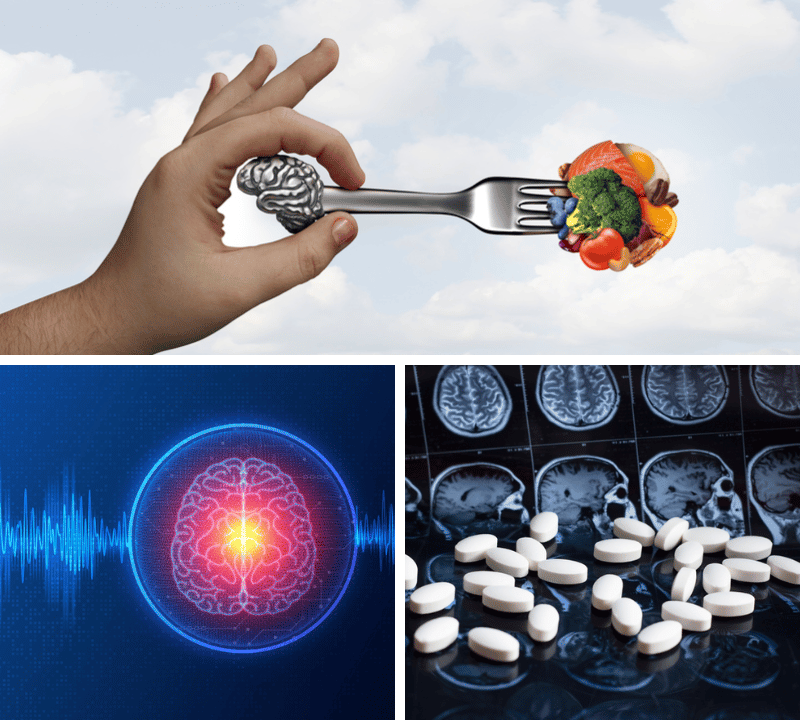








Member discussion